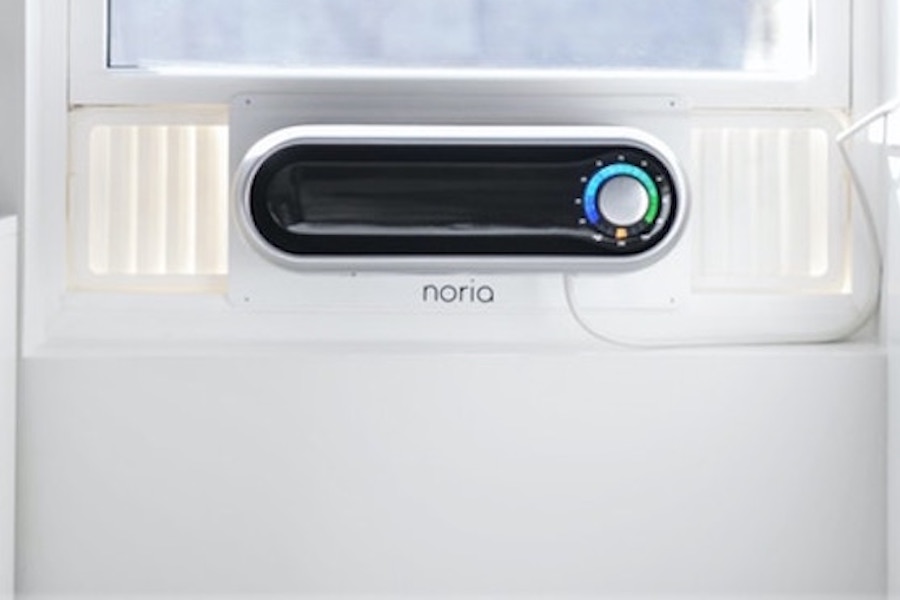Bankruptcy May Loom for Philly’s Biggest Kickstarter Ever

The company behind the Noria aka Kapsul air conditioner, which was Philadelphia’s biggest Kickstarter campaign ever, is a spectacular failure. (Photo via Kickstarter)
Let the backer beware. If there is a moral of the story to the Noria (aka Kapsul) air conditioner, that would be it. The most-funded Kickstarter project in Philadelphia history is a failure.
In 2017, when I first reported on the South Philly company that had set out to revolutionize the home-cooling industry with a slim, “smart” air conditioner, some of the more than 5,000 backers of the Kickstarter and IndeGogo campaigns — which combined raised more than $2 million for the project — wondered where their air conditioners were.
They’d backed Noria/Kapsul in 2016. That’s when the Kickstarter campaign enjoyed coverage in the Inquirer, New York Magazine, and The Verge. On the Kickstarter page, the company estimated that it would deliver the air conditioners in March 2017. But the summer of 2017 came and went without delivery of Noria/Kapsul. Even before that, customers worried that something might be up when the regular updates from the company stopped coming. Backers bandied terms like “skeptical,” “full of crap,” and “rip-off” in interviews with me.
“I know that people are disappointed, I totally get it,” Noria/Kapsul inventor and CEO Kurt Swanson told me in 2017. He went on to put most of the blame on manufacturing issues in China.
Things didn’t get much better from there.
Fast-forward to 2021, when I ran this story: Philly’s Biggest Kickstarter Ever Is Still Infuriating Backers Five Years Later. By then, some backers were throwing around terms like “fraud” and “scam.” They continued to complain about a lack of response and updates from the company. They wondered why Noria/Kapsul couldn’t just refund their money given the years of delays even as the company was offering new units for purchase online with two-day delivery. (While original backers pledged an average of $300 per unit, these units cost $800, the idea being that the difference of $500 per unit would help the company ramp up production and fulfill old orders.) Some backers filed complaints with the office of the Pennsylvania Attorney General.
In a backer update in June 2021, Swanson lashed back at the “loud minority” of investors who, he said, didn’t understand that a Kickstarter project is a “gamble.” He pointed the finger at Donald Trump. He also blamed China, global supply-chain issues, and COVID. And he even took a shot at me. Swanson deemed my 2021 story “a grotesque sample of yellow journalism and outright lies.”
Well, here it is May 2023, and the news isn’t good.
Most backers are still without air conditioners. And many of those who have received units have complained about problems with the air conditioners. They won’t power up. They won’t get cold. The buttons on the face don’t work properly. The lights on the front start freaking out in weird patterns.
According to interim CEO Don Pancoe, Noria/Kapsul is likely headed to bankruptcy court “within a matter of weeks.” Pancoe, who says Swanson resigned as CEO from Noria/Kapsul in July 2022, points to “a cascading series of events” that included a COVID-related port shutdown in China, increased marketing expenses, and the company’s ongoing operating expenses in explaining the company’s failures. Still, he says, the company has managed to fulfill orders from some 1,000 backers.
“Since taking over as interim CEO, we have been trying to find some way to right the company and move things forward,” Pancoe tells me. “However, our outstanding debts and track record, coupled with a historically bad 2022 for both fundraising and the North American HVAC market in general, we did not succeed in doing so. Kapsul management decided to stop pursuing funding ourselves around January of this year, just about the same time as the money completely ran out.”
As for the angry investors’ cries of “fraud” or “scam,” Pancoe insists that neither he nor others “found any fraudulent activity” when they delved into the company’s books.
Pancoe acknowledges some of the problems with delivered units but explains that once inventory ran out, Noria/Kapsul had no units to offer as replacements. And at this point, the company doesn’t even have the resources to have a customer service department to deal with customer concerns.
“The company will likely be liquidated soon,” he says. “Voluntarily or involuntarily.”


